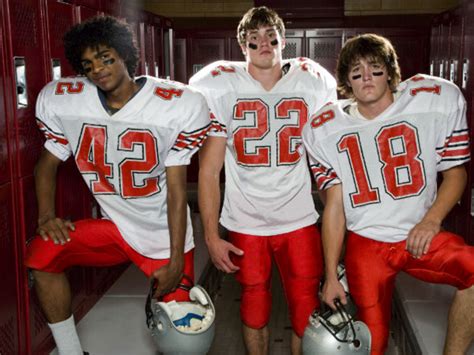
Jocks in High School: A Complete Exploration of Athleticism, Popularity, and Social Dynamics
Introduction
High school is a pivotal time in a young person’s life, characterized by significant physical, emotional, and social changes. For many students, athletics play a central role in their high school experience, offering opportunities for physical development, social interaction, and personal growth. Jocks, as athletes in high school are often called, embody the athletic spirit and occupy a unique position within the school’s social hierarchy. This article provides a comprehensive exploration of jocks in high school, examining their characteristics, roles, and impact on the school environment.

Athleticism and School Spirit
Jocks are known for their exceptional athletic abilities and unwavering commitment to their sport. They consistently demonstrate physical prowess, superior conditioning, and a passion for competition. Their athleticism not only enhances their performance on the field but also contributes to their self-esteem and identity.
Moreover, jocks are often ardent supporters of their school’s athletic teams. They attend games, cheer on their classmates, and embody the spirit of school pride. Their enthusiasm and dedication inspire fellow students and create a sense of community within the school.
Popularity and Social Status
In many high schools, jocks hold a high social status. They are often perceived as cool, popular, and influential. Their athletic achievements and physical attractiveness make them desirable to many students, leading to a large social circle and numerous friends.
Jocks often play a central role in school social events, such as dances and parties. They are seen as fun, outgoing, and energetic, which attracts other students to their company. Their popularity can provide them with a sense of validation and belonging, which can positively impact their self-esteem.
Social Dynamics and Peer Pressure
While jocks enjoy certain social advantages, they can also face unique challenges. The pressure to maintain their athletic performance and social status can be overwhelming. They may feel pressured to conform to societal expectations and stereotypes, which can limit their self-expression and individuality.
Additionally, jocks can sometimes be targets of envy or resentment from non-athletes or students who feel excluded from the popular crowd. This can lead to conflicts and social tension within the school.
Jocks and Education
The relationship between jocks and education is complex. Some studies have shown that student-athletes may have lower academic achievement compared to non-athletes. This may be due to the time commitment required for practices, games, and travel, which can interfere with schoolwork.
However, many jocks are able to balance their athletic commitments with their academic responsibilities. They may have strong time management skills and prioritize their studies. Additionally, athletics can provide students with valuable life lessons, such as teamwork, discipline, and perseverance, which can also benefit their academic performance.
The Role of Sports in High School
Sports play a multifaceted role in high school. They provide opportunities for:
- Physical development and fitness
- Social interaction and teamwork
- Leadership and self-confidence
- Stress relief and emotional regulation
- Educational benefits
Participating in sports can help students develop their physical skills, learn how to work with others, and build their self-esteem. It can also provide a positive outlet for energy and stress, which can improve their academic performance and overall well-being.
Conclusion
Jocks in high school occupy a unique position within the school environment. Their athleticism, popularity, and social status make them influential figures. While they enjoy certain advantages, they also face unique challenges, such as social pressure and potential conflicts with academics.
The role of sports in high school is multifaceted and can provide students with valuable opportunities for physical, social, and personal growth. By understanding the complexities of jocks in high school and the role of sports in education, we can better support the development of our future leaders.
Additional Considerations for Jocks
- Maintain a healthy balance between athletics and academics
- Seek support from parents, teachers, and coaches
- Address social pressures and stereotypes
- Explore individual interests and activities outside of sports
- Focus on personal growth and character development
Tables
| Characteristic | Description |
|---|---|
| Athleticism | Exceptional physical skills and competitive drive |
| Popularity | High social status and large social circle |
| School spirit | Ardent support of school athletic teams |
| Social pressure | Expectations to conform and maintain status |
| Role | Description |
|---|---|
| Teammates | Collaborators on the field or court |
| Role models | Inspiration for other students |
| Community members | Active participants in school events |
| Leaders | Mentors and guides for younger students |
| Benefit | Description |
|---|---|
| Physical fitness | Improved cardiovascular health, strength, and coordination |
| Social skills | Team building, communication, and conflict resolution |
| Leadership | Develops confidence, decision-making, and accountability |
| Stress relief | Provides a healthy outlet for energy and emotions |
| Education | Teaches discipline, time management, and perseverance |
| Challenge | Description |
|---|---|
| Time constraints | Balancing athletics with academics can be difficult |
| Social pressure | Expectations to conform and maintain status |
| Stereotypes | Limiting self-expression and individuality |
| Injuries | Physical risks associated with athleticism |
| Social conflicts | Envy or resentment from non-athletes |











